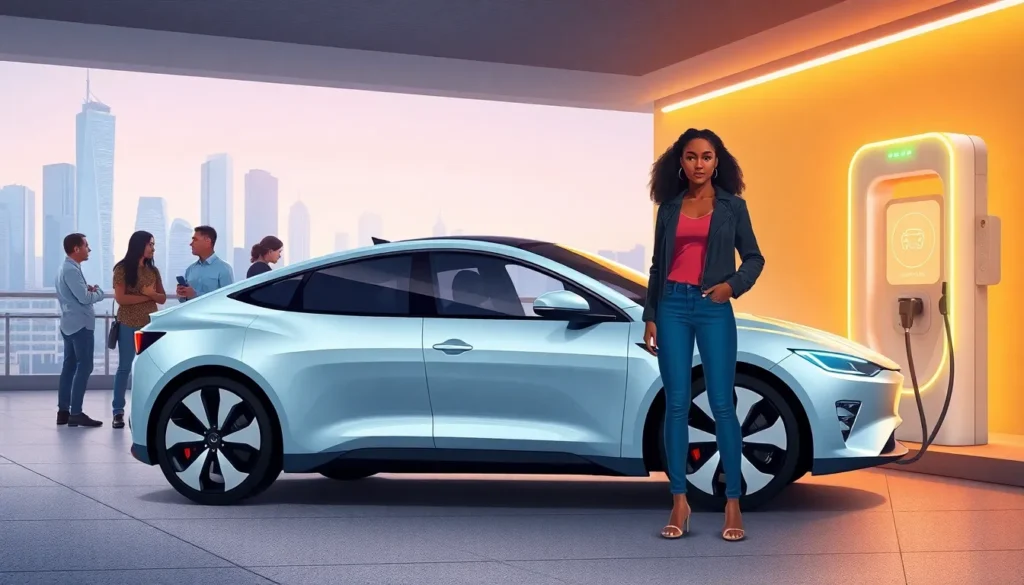Table of Contents
ToggleThe world of automotive technology is revving up faster than a sports car on a straightaway. From electric vehicles zooming past gas guzzlers to self-driving cars that make even the most seasoned drivers feel like they’re on a wild roller coaster, there’s never a dull moment. Keeping up with the latest trends isn’t just for gearheads; it’s for anyone who wants to stay ahead of the curve in this high-speed race.
Imagine a future where your car not only drives itself but also tells you when it’s time to grab a coffee. Sounds like something out of a sci-fi movie, right? Well, buckle up because the latest automotive innovations are here to make that dream a reality. Dive into the exciting world of automotive technology news and discover how these advancements are steering us toward a smarter, safer, and more thrilling driving experience.
Latest Trends in Automotive Technology
Automotive technology continues to evolve rapidly, reshaping the future of transportation. Keeping up with these trends is essential for anyone curious about the driving landscape.
Electric Vehicles Advancements
Electric vehicles (EVs) gain traction due to impressive battery technology improvements. Manufacturers now produce batteries with ranges exceeding 300 miles on a single charge. Charge times have reduced significantly, with some models offering 80% charge in under 30 minutes. The expansion of charging infrastructure supports this shift, making EV ownership more convenient. Incentives, including tax credits and rebates, encourage consumers to switch from traditional vehicles. Companies are investing in sustainable production methods, focusing on eco-friendly materials for vehicles.
Autonomous Driving Innovations
Autonomous driving technology sees advancements in sensors and artificial intelligence algorithms. Companies develop vehicles that can interpret complex driving environments in real-time. Level 4 autonomy indicates the vehicle can operate independently in specific conditions without human intervention. Safety remains a primary concern, prompting extensive testing across various scenarios. Regulations regarding autonomous testing are evolving, ensuring public safety while fostering innovation. Partnerships between tech companies and automotive manufacturers accelerate the development of self-driving features.
Major Industry Changes

Recent shifts in the automotive sector highlight crucial changes shaped by mergers and innovations. Companies are consolidating to stay competitive and adapt to rapidly evolving technology.
Mergers and Acquisitions
Partnerships between leading automotive manufacturers and tech firms drive significant advancements. Major players acquire smaller startups that specialize in artificial intelligence or battery technology, enhancing their capabilities. Notable deals include the purchase of tech companies that focus on autonomous driving solutions. For instance, major automakers have expanded their portfolios by acquiring AI firms to improve vehicle perception and decision-making. Increased competition fuels this trend, pushing businesses to collaborate for innovation.
Regulatory Developments
Regulations are evolving to accommodate advancements in electric and autonomous vehicles. Governments are drafting new policies aimed at ensuring safety while promoting innovative technologies. Recent legislation encourages the development of charging infrastructure, making it easier for consumers to transition to electric vehicles. Additionally, safety standards for autonomous driving technology are being updated, outlining requirements for manufacturers. Regulatory bodies emphasize the importance of testing to ensure reliable performance in real-world environments. These developments pave the way for widespread adoption of advanced automotive technologies.
Key Players in Automotive Technology
The automotive technology landscape features diverse players driving innovation and change.
Startups to Watch
Innovative startups are emerging as significant contributors to automotive technology advancements. Companies like Rivian focus on electric vehicle production, offering impressive range and off-road capabilities. Arrival, another rising star, develops electric vans and buses with a modular design, targeting urban logistics. Other notable mentions include Canoo, which emphasizes customizable, multifunctional electric vehicles and Aptera, pioneering the lightweight solar electric vehicle. Each startup is redefining mobility solutions while addressing sustainability and efficiency.
Established Companies Making a Difference
Established companies remain pivotal in shaping the future of automotive technology. Tesla leads the electric vehicle market, showcasing cutting-edge battery technology and autonomous driving capabilities. Ford embraces electrification with the Mustang Mach-E and F-150 Lightning, blending tradition with innovation. General Motors is committed to an all-electric future, planning to increase its EV offerings significantly by 2025. Meanwhile, Toyota continues to prioritize hydrogen fuel cell technology alongside electric vehicles, promoting clean energy solutions. These giants adapt rapidly to technological advancements, striving to meet evolving consumer demands while maintaining competitive advantages.
Future of Automotive Technology
Innovations in automotive technology are set to redefine the future of transportation. The sector is experiencing a surge in developments that promise to enhance vehicle performance, safety, and sustainability.
Emerging Technologies on the Horizon
Innovative battery technology is revolutionizing electric vehicles, focusing on longer ranges and shorter charging times. Advanced driver-assistance systems (ADAS) are also enhancing safety, with improvements in vehicle perception through sensors and machine learning. Another area of growth includes Vehicle-to-Everything (V2X) communication, which enables cars to interact with their environment for increased safety and efficiency. Furthermore, the integration of augmented reality in navigation systems offers drivers enhanced situational awareness. Overall, these technologies are paving the way for a more connected and efficient driving experience.
Predictions for the Next Decade
Advancements in autonomous driving may lead to widespread adoption of Level 4 vehicles over the next ten years. More cities are likely to implement regulations supporting electric vehicle integration into public transport systems. Increased competition among manufacturers could drive down costs for consumers, making EVs more accessible. Investment in charging infrastructure is expected to rise, enhancing convenience for electric vehicle owners. As technology evolves, a broader range of mobility solutions is anticipated, including shared autonomous services. These trends will transform the automotive landscape, creating smarter and more sustainable transportation options.
The automotive landscape is evolving rapidly with technology at the forefront of this transformation. As electric vehicles and autonomous driving become more mainstream, the future promises an exciting shift in how people interact with their vehicles. Innovations in battery technology and AI are paving the way for safer and more efficient transportation options.
Key players in the industry are collaborating to push the boundaries of what’s possible, ensuring that advancements benefit consumers and the environment alike. With ongoing developments and regulatory support, the road ahead looks promising for both automotive enthusiasts and everyday drivers. Embracing these changes will lead to a smarter and more sustainable driving experience for everyone.




